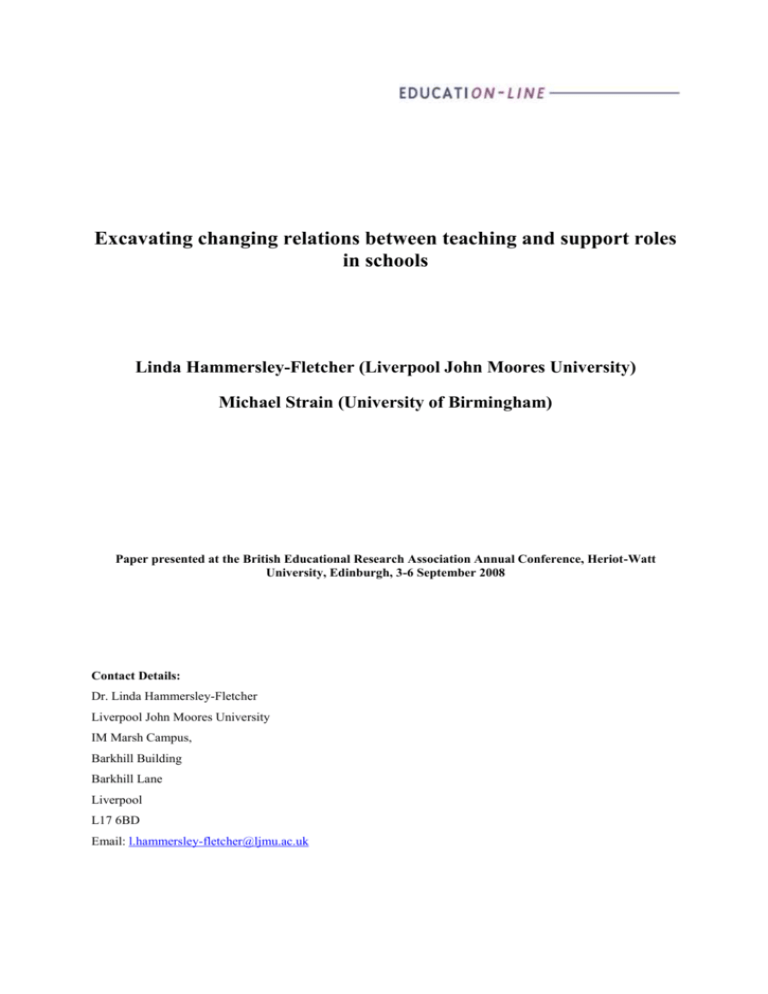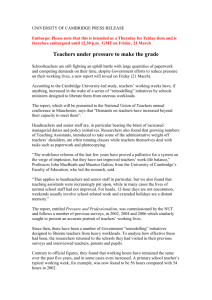An abstract of (maximum) 1000 words which must include all
advertisement

Excavating changing relations between teaching and support roles in schools Linda Hammersley-Fletcher (Liverpool John Moores University) Michael Strain (University of Birmingham) Paper presented at the British Educational Research Association Annual Conference, Heriot-Watt University, Edinburgh, 3-6 September 2008 Contact Details: Dr. Linda Hammersley-Fletcher Liverpool John Moores University IM Marsh Campus, Barkhill Building Barkhill Lane Liverpool L17 6BD Email: l.hammersley-fletcher@ljmu.ac.uk Excavating changing relations between teaching and support roles in schools Abstract Workforce remodelling in schools was developed in response to teachers’ feelings of disempowerment and work overload, providing opportunities and designated time for professional reflection, work planning, and engagement in wider processes of school management and change. The time allowance was made possible by the development of support roles for teaching assistants (TAs). Thus remodelling has been developed both as a framework for continuous functional adjustment among professional and operational roles, and, though less overtly, as a vehicle for a significant redistribution of power (Hartley, 2007a). This paper will critically examine the steps whereby structural remodelling in schools since 2002 has created a framework for an integrated school staffing structure that accords recognition and participation to all employed in the school to work directly with children. We explore the extent to which these moves may be part of a wider configuration of changing relationships in knowledge production and dissemination. We draw upon data commissioned by and conducted across 2 Local Authorities (LA) and obtained from Chairs of Governors, Head Teachers, Senior Leaders, Class Teachers, Teaching Assistants and other support staff. Their perspectives are analysed through content analysis and application of SPSS. Our findings suggest that staff in these schools have acquired or exchanged elements of what used to be separate roles as teachers and teaching assistants, with consequent changes to their professional relationships (Hartley, 2007b). Whilst it may be thought that involvement by a wider range of staff in supporting children’s learning would reduce distance and division in management relations, we find that such changes may be leading to the development of more complex distributions of power both at whole school level and within each sub-group. Hammersley-Fletcher and Strain 1 Excavating changing relations between teaching and support roles in schools Changing relations in the school Educational changes introduced in England over the last 30 years 1 have increased requirements for teachers to be accountable and for pupils to be assessed on a national basis with published results. In the same period, greater opportunities for school choice among parents and young people have been created, and school governing bodies have won the freedom to use resources in support of locally identified aims and goals. In return, schools must provide a wider range of information to parents. Alongside these initiatives, governments have also increased their control over the taught curriculum through more formalised monitoring mechanisms, including more inspections which emphasise measurable outcomes as well as requiring more explicit teacher and school accountability. For teachers, the consequences to which we respond here are well summarised by Day (2002, 677); As a consequence of (imposed) changes in the control of curriculum and assessment and increased measures of public accountability, teachers in most countries now work within cultures in which their careers are ever more dependent upon external definitions of quality, progress and achievement for their success. Although many experienced teachers have maintained their identities, finding room to manoeuvre within a general reduction in their traditional classroom autonomy, the pressure on these and younger colleagues is to comply with competency based agendas. Teacher stress is now endemic, a ‘normal’ working condition2. Endemic professional anxiety may be associated with a profound change in the governance of education, from one that rested on ‘faith in authority’, invested in the post-1944 tripartite power alliance between politicians and teachers, to one of reliance upon the ‘authority of faith’3 in the power of professional leaders to secure the ‘hearts and minds’ of ‘stakeholders’. Paradoxically, discontent and a general distrust among parents and the wider public 4, in relation to the reliability, capacity and efficacy of schools and teachers’ efforts to teach and promote individual children’s learning and well being, has during the same period become more evident. A climate of distrust has been further exacerbated by attacks in the press on teacher’s professionalism (a feature also noted in America, see Smylie et al, 2004). As a consequence, the recruitment, retention and deployment of teachers became a serious and problematic issue for the government. One response has been to introduce workforce remodelling in schools (Gunter, 2008, 255-6), ostensibly to help address teachers’ feelings of disempowerment and work overload, offering opportunities in the form of designated periods of time to reflect upon their work and engage in wider processes of school management and change (DfES (2003). A time allowance (10% off time-table to plan, prepare and assess – PPA) for these activities has been made possible partly through the development of learning support staff roles, so that they can be deployed more directly, though under supervision, in classroom learning. Other forms of classroom cover may be arranged through employment of external experts, such as sports coaches, or music specialists, who set up a programme of visits to the school. Schools may also employ cover supervisors. In these ways, remodelling has been developed both as a framework for continuous functional adjustment among professional and wider operational roles, and, though less overtly, as a vehicle for a redistribution of roles within the education workforce. This educational ‘Workforce Agenda’ has recently been enlarged to include a wider range of workers providing personal services to children and young people. Significant questions now arise as to how power redistributions arising from changes in existing working relations may affect schooling outcomes. Engaging cheaper staff or external specialists to take on some of the additional workload imposed by the workforce reforms poses some fundamental questions about the nature of 1 i.e. from the introduction of changes to the constitution and operation of governing bodies, recommended in the Taylor Report (1978), which recommended teacher and parent membership of GBs (closer partnership), better teacher training, and clearer definition of educational objectives. 2 Kyriacou, C. (2001) Teacher Stress: directions for future research. Educational Review, 53.1, pp 27-35. 3 The Lutheran revolution of theory was characterised by Marx as the internalisation of man’s consciousness. Luther, according to Marx, ‘destroyed faith in authority by restoring the authority of faith’ (McLellan, 1973, 92). 4 See Quicke (1988) The New Right and Education. BJES 26.1, 5-20. Hammersley-Fletcher and Strain 2 Excavating changing relations between teaching and support roles in schools pedagogy under the new teaching arrangements (Gunter and Rayner, 2007), about whether the curriculum is simply a set of learning tasks to be taught and assessed, or a mode of personal engagement with pupils’ learning experiences (Fielding, 2006). In this paper we pay particular interest to the expanding role of the Teaching Assistant (TA). This expansion not only enhances the professional status of TAs themselves (particularly in the light of developing status recognition mechanisms (HLTA) and qualifications (Foundation Degrees)), but also reprofessionalises teachers, though in ways that may be contested and problematic (Beck, 2008). Expansion and changes in TA roles demonstrate some blurring of the boundaries between teachers and TAs (Saunders, 2006). This can be seen in the changing expectations of what the role of a TA encompasses. The role 5 meets teaching and learning support needs in the school on five functional fronts: Administration, Learning Support, Pupil Support, Site Staff, and Specialist and Technical. In each of these functional areas, support staff obtain NVQ level 2 and 3 qualifications, affording access to a Diploma and Foundation Degree. Optional early units include supporting literacy and numeracy initiatives in the classroom, maintaining site security, and liaising effectively with parents. In what follows in this paper we explore the changing roles played by Teaching Assistants and examine the extent to which these new roles have changed characteristic activities and perspectives. Method The data on which this paper draws were obtained in the course of projects commissioned by two local authorities (LA) from the English midlands between 2004 and 2007. The first LA saw the research as part of an overall strategy around the investigation and support of remodelling described as ‘a unique venture, based on an amalgam of change theory and practice’ (Hammersley-Fletcher, 2007a, foreword). LA activity around remodelling included the retraining of LA personnel and working with groups of schools and school staff (and in particular head teachers). The LA hoped to establish the extent to which their schools were now ‘thinking and doing things differently’ (ibid). Alongside this major commitment to the remodelling project the LA itself was also experiencing a period of major structural change and regional demographic development. As a consequence the research provided an important element in the strategies adopted by the LA in coming to understand and respond to the impact of these change initiatives. The second LA commissioned the research having seen the first stage report from the first LA. Having considered the similarities and differences between the first authority and their own practices this LA was interested to investigate whether remodelling was seen ‘as another central agenda to implement or as a holistic change management process and the extent to which that view led to a remodelled workforce’ (Hammersley-Fletcher, 2007b, foreword). Workforce remodelling was not simply about changes in organisational structure, although they were among the explicit objectives of the process. This project attempted to look beyond surface change to reveal how educators’ perceived their roles, how they made sense of the changes and how their views and professional relations were affected (see for example O’Brien et al 2008). As a consequence an ethnographic approach was adopted. But it is difficult, as Silverman (1993) pointed out, to capture the ‘inner experience’, since it is impossible to observe perceptions and meanings. Nevertheless this study draws upon a range of data that capture participant behaviour, accounts and perceptions about what had taken place and the research process attempted to unpack and make sense of these findings. BERA (2004) ethical guidelines were adopted throughout to ensure participant confidentiality and anonymity. Data collection involved semi-structured interviews in both LAs, a survey in the first LA and the use of survey data collected by the second LA. In both LAs interview data were collected from schools representing those typical of the region. In the first LA (LA1) 4 primary and 4 secondary, were identified and 2 sets of interviews undertaken within one academic year with a range of staff including a member of the leadership group (head teacher, deputy, subject manager or year manager), members of the teaching staff and members of the support staff (teaching assistants, learning support assistants, administrative and pastoral staff). Further interviews were conducted in 6 of these schools (3 primary and 3 secondary) following a questionnaire, administered between interview periods. The questionnaire was designed and piloted before distribution in 2006 to a representative (25%) sample of all 4690 staff. The return rate was 12% (545 questionnaires). The largest proportion of returns were from senior leaders, including head teachers (31%), with 16% from teachers, 10% from teaching assistants, 11% from administrative staff and 1% from support staff. Thirty six percent of the returns were from primary schools and 58% from the secondary phase. In the second LA (LA2) interviews were conducted in 5 primary and 1 secondary school. In this case the LA made contact with schools and found it difficult to recruit secondary 5 Teachernet - http://www.teachernet.gov.uk/wholeschool/remodelling/ Hammersley-Fletcher and Strain 3 Excavating changing relations between teaching and support roles in schools schools who were going through a period of change and disruption. As a consequence this secondary school could be identified by the LA and so data from this school has been utilised sensitively. Interviews were conducted with the Chair of Governors, head teacher, teacher-governor, teaching assistant, administrative support staff. In addition data were made available from survey data acquired by the LA. Enhanced Roles for Teaching Assistants From the interviews with TAs, it is apparent that their role has changed from ‘assistants’ who wash the paint pots, wipe noses and get the teachers a cup of tea to team members involved in a much more complex range of learning activities. As the following extract demonstrates, TAs now have a multiplicity of roles and levels of responsibility, including a part in managing other TAs, developing initiatives in the classroom, and taking responsibility for elements of children’s learning at a whole class level. I’m a high level teaching assistant… [and] a co-opted governor on the governing body… since re-organisation in 1996 [10 years experience at time of interview] … the HLTA’s [Higher Level Teaching Assistants] cover PPA time so we don’t need to bring in … supply staff … we cover… which has obviously seen a difference with behaviour in children, and it’s the continuity that’s helped, because obviously we know what’s going on, especially now when you have like three or four week topics, you can carry on with the same thing… I’m based in year 2, so I cover between the two year 2 classes, not only for PPA but also for course time and curriculum time that those two class teachers need, but also with my knowledge, I’m also in NVQ level 3, which takes me up obviously to age 8, so I cover in year 1 and in year 3, 4. TA primary 5 LA2 This brief account reveals the poly-functionality of a TA holding a wide range of responsibilities, including teaching and learning activities with several age groups and leading another TA in support. Whilst experienced and highly regarded within the school, as suggested by the range of activities for which she is given responsibility, this TA has no formal training beyond NVQ. Another interesting development to be observed in this account is the extent to which specialisation is now a feature of some TA roles. One of those interviewed explained the basis of their (perceived) superior position in the TA hierarchy as follows: I’m a senior teaching assistant. However my position is slightly different to the other teaching assistants because I have a split timetable… Fifty per cent of my time is taken up with the learning support department in that I run small workshops for behaviour and self esteem-building skills… The rest of it is in the history department … This is my third year in mainstream now… When I came here…I felt they [the TAs] lacked training, up to date training… and when [the Head] came here… his priority full stop is training… We’re not teachers, we’re not helpers, I mean, you get some of the kids who’ll say, oh you’re a helper, no I’m not a helper. I’ve got lots of qualifications and need to be recognised for that. You know, I’ve done a lot of training. I’ve got a lot of time behind me. So, in the job description you would have just the ordinary sort of TA that did general helping out in the class room. You know, dishing out of photocopied work sheets and then you’ve got a sort of the specialist TA that might have training in hearing impaired or visually impaired, specific learning difficulties, everybody’s got their own bit… TA secondary 2 LA1 This TA was anxious to indicate that she was playing a different role from others who might be considered ‘general helpers’. In secondary schools this mix of TAs performing a general role alongside those able to specialise and assume higher levels of responsibility and pay was more apparent than in primary schools, where all TAs fulfilled extended general roles on a sliding scale of pay and formal recognition. What is also apparent here is the importance of the head teacher’s role in supporting training and development for TAs. Yet primary Hammersley-Fletcher and Strain 4 Excavating changing relations between teaching and support roles in schools head teachers could also be found operating with an opportunistic and at times autocratic model of headship (“ my teacher assistants”) under which detailed application of the role guidelines are implemented by the head teacher acting alone (“that is my choice because I think it’s good for me”). My teacher assistants do a lot of literacy and numeracy, a lot of precision teaching, a lot of group work teaching, but that doesn’t fall into PPA time. I also give the teacher assistants some time off on a Friday because they need to plan, or get resources ready, so while all the school are doing extended writing activities on a Friday morning the teacher assistants have some time. However some teacher assistants choose not to have that time. I just felt it had to be a bit of give and take. In the nursery however I wasn’t, I didn’t feel confident, because the nursery is a separate building, I didn’t feel confident for a high level teaching assistant to go over there without a trained teacher, so I go and do a PPA time over there, and that is my choice because I think it’s good for me to see the children once a week and actually teach. Head teacher primary 5 LA2 The interviews also indicated that TAs were enthusiastic about the possibility of developing their skills further and of engaging in additional external training. Such training was closely linked to extending their role responsibilities. Alongside this, the need for respect and recognition of the work done was apparent, and TAs seemed more active in environments where they felt valued. … I’ve set up buddy band in the playground, which I’ve been running, which I gave the children a chance, told them what it was all about. I then gave out forms, if they wanted to become part of it they filled out the form. We then had a meeting and I discussed what was going on and basically what I wanted them to do. And it’s just activities that go on in the playground, the year five/six children run them so it gives them a bit of responsibility. So as far as that … that’s new that I’ve implemented since I started here … I feel it’s going really, really well… …we’re [all staff] always talking about what we’re doing, why we’re doing it, how we’re involving the children… I think that’s great that the teachers are encouraging you, especially as they see your work as well, they know what you’re capable of …I think happy … staff creates happy children as well. If the staff are happy and enjoying their job, then the children will respond to that and they’ll be happy … TA primary 1 LA2 Here the support of the teaching staff had led this TA to initiate a playground support group, and throughout the interview she talked about how much she enjoyed her role. She was also considering going into teaching with the encouragement of the teaching staff. In another interview however, whilst celebrating greater team work, a TA expressed cynicism about role specifications and pressure to perform extended functions. I’m teaching assistant, first-aider and staff governor… [I have been here] twenty years… we work together more as a team with the teaching staff, whereas perhaps before …it may have been us and them... the person that I work with, she finds it … we say okay, we wouldn’t say we were ecstatic about it [taking responsibility for classes but …other people don’t like it] at all although they do it because it’s expected of them… I think that if there is any bad behaviour [from the children], they don’t feel in control … there’s also the pay, the pay is an utter pittance, but then it is for TAs anyway. We’ve had all these fancy titles and all the rest of it, supposed to be earning the appropriate amount of money, but in our opinion it isn’t enough … TA primary 3 LA2 Pay is an important issue. Most schools appeared to have introduced differential pay scales for TAs depending on rank and whole class responsibilities. These scales, however, are significantly lower than teachers’. Hammersley-Fletcher and Strain 5 Excavating changing relations between teaching and support roles in schools Consequently, schools found that they could save money on supply teaching costs by using TAs in classrooms or paying for classroom supervisors. This was particularly common in primary schools, where the introduction of the 10% non-contact planning, preparation and assessment (PPA) time brought with it the prospect of increased classroom teaching cover costs. Developing collaborative relations among staff was a topic raised in many of the interviews, where TAs talked of the benefits of working in teams and talking through aspects of the curriculum and classroom teaching and learning strategies with teachers. The TAs were also very loyal to their teachers and wished to point out that the teacher’s role was different from their own. I’m a teaching assistant, and I’ve been here for about…five years… the main change… [is] teaching assistants taking on the role for the PPA time … we’re encouraging the training now, looking at the skills that we’ve got, when we did an audit of all of our skills to see, obviously, the different areas that we were competent in that maybe people … weren’t aware of before and we could possibly be using those skills… I’m doing a foundation degree … not sure whether it’s [remodelling] going to be beneficial for the children… teaching assistants have got different things to offer and probably do enrichment activities, but when it comes to the curriculum, we obviously haven’t got the broad knowledge that teachers have got… TA primary 4 LA1 The respondent here asserts both the superior knowledge of the teacher and the need to use the TA’s current skills. She also expresses her misgivings regarding the children’s education. This echoes many of the fears expressed by teacher unions (Karseth and Nerland, 2007)6 and in particular the NUT (Stephenson, 2007). To what extent are TAs leading, as distinct from supporting learning? From these interviews, TAs prefer to be seen as supporting learning. But a support role can be problematic in situations where the TA assumes de facto full classroom responsibilities. The HTLA role specification (TDA Guidance) includes teaching, learning and assessment duties, and these appear to have been accepted and implemented in the schools interviewed. What remains unclear is what curriculum and pedagogical assumptions now underpin practice in relation to how learning is encouraged and sustained within these new role distributions in schools. Benefits for teachers Some teachers and head teachers saw advantages in implementing PPA by reducing teacher workloads and encouraging the wider sharing of ideas. …it definitely has, sort of, given us time… time for teachers… I’d say it has helped, because I’ve got that person there then to chat with and… it’s … two heads…! Teacher primary 4 LA1 Workload benefits for teachers have been felt and acknowledged in both primary and secondary schools, but more as relief from an increasingly unfair burden on teachers, rather than enhancement as such. …I think it’s been positive because teachers, and I include myself, cannot go on working to the level that we do… for the length of time that we have over the year without it having some effect on the children … I think staff are looking at their own work/life balance and staff… are saying: “I’m not taking that home, I’m not doing that, there’s another day 6 Their research, exploring dominant knowledge discourses among Norwegian associations for teachers, nurses, engineers and accountants, is most illuminating in this context. Hammersley-Fletcher and Strain 6 Excavating changing relations between teaching and support roles in schools tomorrow”… two years ago, staff were taking carrier bags home – and I was. Then the carrier bags moved into little wheelie trolleys. Now staff are staying in school perhaps longer, but they’re not taking things home… and I certainly … as head… my philosophy now is: well – there is another day tomorrow and that seems to work… and I hope staff… are also doing the same so no – it’s been a great opportunity… Head teacher primary 2 LA1 Teachers generally tended to be more cynical, or sceptical about the implications and consequences of remodelling. This was more evident in the secondary sector where staff recognised that the government had used the remodelling initiative to try to get more for less from schools, in ways similar to tactics used elsewhere in the public services. …it [remodelling] is a government con… to redistribute scarce resources in the public sector, because it’s paralleled in the health service and in the police, and it is giving the public the impression that they are addressing all the morale issues in the public sector that the professionals in there were voicing in the 90’s… they have…developed a progression system within education which is mistrustful of the profession… Senior leader secondary 4 LA1 In this operation, staff welfare and morale were perceived by staff as a ‘stealth’, or hidden cost, within a wider redistribution of resources in public education whereby outcomes would be increased without proportionate increases in costs. For many, not surprisingly, anxieties about job security have replaced workload related stress. …Staff morale here is at… its lowest purely on the basis of what the teachers have said to staff – that nobody’s job is safe, we have redundancy notices each year… for overstaffing… and yet we like to buy two for the price of one when teachers are newly qualified and cheap and they’re given permanent contracts. We have two cover supervisors – they’ve just been given permanent contracts. … one of these cover supervisors… the experience – they’ve done six hours. The other one’s got none… this job is a stepping stone for them. So they would obviously gain the experience that they need, and move on… Teacher secondary 1 LA1 The evidence suggests that teachers are experiencing widespread resignation, demoralisation and confusion regarding roles and professional purposes. …the problem is no one actually can say that the amount of hours that a teacher works, and at the same time no one can actually … no one teacher works the same length of time, it’s not uniform. A lot of it is down to your own conscience, sometimes it’s your professionalism… there’ll be never any end to it. It’s a bit like the NHS system isn’t it, that you’ll always have sick people waiting at the door and it’s the same with teaching …I mean you’ve been in teaching and you’ll then suddenly say you should now be able to differentiate for every individual child. I mean years back if you managed to do three groups, even years back if you managed just to do a class, you were fine. But constantly new research, new directives and if you’re someone who wants to embrace a bit of change, and you’re consciously aware that yeah that would be a positive benefit, then you’re all the time picking up more things aren’t you? So no matter how much you do …I don’t think there’s ever any end to it, but at the same time it can’t be resolved… Teacher primary 3 LA2 Using PPA to obtain specialised resources externally, using PPA funds, seemed in most schools to work well and to fulfil widely agreed needs Hammersley-Fletcher and Strain 7 Excavating changing relations between teaching and support roles in schools …What the management tried to do and this is sort of upheld by a lot of, well by all of us, was that [Head] tried very hard to get skills in that we don’t teach particularly well or don’t have the expertise in, such as modern foreign languages, sport, music, drama, those sorts of things that you really want to be done in school and done well…the whole of key stage 2 had provision in modern foreign languages, music and sports, as part of the PPA time … Teacher primary 2 LA2 …we took a decision to use [the football club] Community Programme to actually cover some of the PE curriculum to release staff, and because we tried basically wanting to keep it as curriculum based as possible for the children, in Year 6… we actually employed somebody… he actually comes and does French sessions with Year 6, basically also to try and sort of meet some of the MFL, Modern Foreign Languages, curriculum which we know is coming… Senior leader primary 3 LA1 Conclusions We suggest, on the basis of this evidence, that shifts in the roles played by staff in schools combine elements of what were formerly distinct roles, of teachers and teaching assistants, and that these role changes will alter those relationships. We go on to discuss a paradoxical finding, that the complexities inherent in these changes are inducing both teachers and teaching assistants to search for a more clearly defined boundary between their roles. Whilst it may be thought that wider staff involvement in supporting children’s learning will reduce divisions and distance among management relations, we argue that such changes could lead to development of complex distributions of power operating both at whole school level and within staff sub-groups. In future work, we hope to explore these shifting relations further, and to examine how far the primacy of staff experiences, the material social world (Maffessoli, 1996, 150-2) of working relationships in practice, are effective in changing these relations and implicit power distributions. In particular, we identify two under-examined aspects of these changes: assumptions concerning learning and pedagogy – are they understood; and do they support the conditions of learning which the new workforce arrangements make possible? Secondly, are the learning outcomes achieved under these new conditions compatible with what might be termed a politically acceptable default measure of educational opportunity for all? Hammersley-Fletcher and Strain 8 Excavating changing relations between teaching and support roles in schools References: Beck, J. (2008) Governmental professionalism: re-professionalising or de-professionalising teachers in England? British Journal of Educational Studies, 56 (2), pp 119–143 Day, C. (2002) School reform and transitions in teacher professionalism and identity. International Journal of Educational Research, 37(8): 677–692. DfES (2003) Raising Standards and Tackling Workload: A National Agreement. London: DfES. Fielding, M. (2006) International Journal of Leadership in Education, 9 (4), pp. 299-313. Gunter, H. (2008) Policy and Workforce Reform in England. Educational Management Administration Leadership, 36(2): 253-270. Gunter, H. and Rayner, S. (2007) “ Modernising the School Workforce in England: challenging transformation and leadership” in Leadership 47 (3) pp 47-64 Hammersley-Fletcher, L. (2007a) Remodelling Schools; engaging in the change agenda part two, second Report to Staffordshire Local Authority, Feb 2007 Hammersley-Fletcher, L. (2007b) Remodelling Schools; management of change Report to Warwickshire Local Authority, April 2007 Hartley, D. (2007a) Education Policy and the 'Inter'-Regnum. Journal of Education Policy, 22(6) 695-708. Hartley, D. (2007b) The Emergence of Distributed Leadership in Education: Why Now? British Journal of Educational Studies, 55(2) 202-214. Karseth, B. and Nerland, M. (2007) Building professionalism in a knowledge society: examining discourses of knowledge in four professional associations. Journal of Education and Work, 20(4): 335-355. Maffesoli, M. (1996) Ordinary Knowledge: An Introduction to Interpretative Sociology. Cambridge: Polity Press. McLellan, D. (1973) Karl Marx: His Life and Thought. New York: Harper and Row. O’Brien, M., Varga-Atkins, T., Burton, D., Campbell, A. and Qualter, A. (2008) ‘How are the perceptions of Learning Networks shaped among school professionals and head teachers at an early stage in their introduction?’ International Review of Education Vol 54: pp211–242 Saunders, M. (2006) From ‘organisms’ to ‘boundaries’: the uneven development of theory narratives in education, learning and work connections. Journal of Education and Work, 19(1): 1–27. Hammersley-Fletcher and Strain 9 Excavating changing relations between teaching and support roles in schools Silverman, D. (1993) Interpreting Qualitative Data: Methods for Analysing Talks, Texts and Interaction London: SAGE Smylie M. A., Miretsky, D. and Konkol, P. (2004) Rethinking Teacher Workforce Development: A Strategic Human Resource Management Perspective Yearbook of the National Society for the Study of Education, 103 (1): 34–69. Stephenson, H. (2007) Restructuring Teachers’ Work and Trade Union Responses in England: Bargaining for Change? American Educational Research Journal, 44(2): 224–51. This document was added to the Education-line database on 17 October 2008 Hammersley-Fletcher and Strain 10




